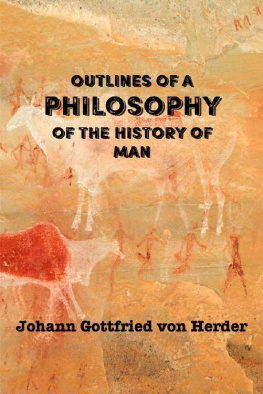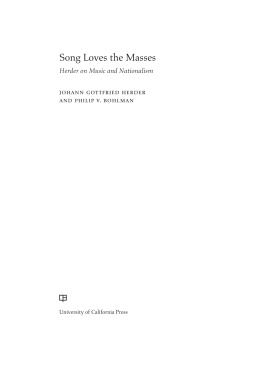Table of Contents
Outlines of a Philosophy of the History of Man
by Johann Gottfried von Herder
A well-formatted version of T. Churchills translation of Ideen zur Philosophie der Geschichte der Menschheit , by Johann v. Herder. Scanned and newly formatted from the original, published in London in 1800, and in New York by Bergman Publishers.
For other well-formatted titles please visit:
randomshackpublishing.com
EditorS PREFACE
I have modernized spelling, punctuation, typography and syntax, while trying to remain faithful to both the text and the writers style. No doubt errors remain despite several proofs, but hopefully none that will detract from the material.
David G. Payne
Petoskey, 2016
TRANSLATORS PREFACE
Everyone who is acquainted with Herder must be aware of the difficulty, if not impossibility, of translating his spirit, his words that burn, into another language. To have undertaken a task so arduous may be deemed presumption in me, and no one can be more sensible than myself that, in the execution of it, I am far, very far, from having done what I wished, and what it would have been the height of my ambition to have accomplished.
Yet I did not engage in it without the encouragement of one who can appreciate the merits of Herder, who happily unites a critical knowledge of the English language with that of the German, and to whose kindness I am indebted for the explanation of many passages and the improvement of many expressions, as well as some notes distinguished by the signature F. I trust, therefore, I shall have afforded some gratification to the English reader, and added to our stock a valuable book; for surely all the merit of Herder, all the beauty and sublimity of his ideas, cannot be obscured by any translation.
For myself, at least, though laborious, it has been a pleasing toil: many moments of bodily pain and mental anxiety has it sweetly beguiled, and while it has made my breast glow with the fervor of virtuous sentiment, I have almost felt myself the inhabitant of another world. May others feel from the perusal what I have done from the performance; and then no one, I hope, will lay down the book without being able to say that he is a happier and a better man.
London, Nov. 15, 1799.
PREFACE
When I published ten years ago the little tract entitled Another Philosophy of History for the Improvement of Mankind, this title was by no means intended to proclaim, Ancio son pittore , (I, too, am a painter), it was meant rather as a supplement to many supplements of the present Century, and the subjoined motto, as an expression of humility, implying that the author, far from exhibiting it as a complete philosophy of the history of our species, merely pointed out, amid the numerous beaten roads that men are perpetually treading, one little foot-path, which had been neglected, and yet was probably worth exploring. The works quoted occasionally in the book were sufficient to show the wellworn paths from which the author wished to turn his steps, and thus his essay was intended for nothing more than a loose leaf, a supplement to supplements, as its form likewise evinced.
The whole of the impression was soon sold, and I was encouraged to prepare a new edition; but it was impossible that this should appear before the public in its former state. I had observed that some of the ideas contained in my tract had been introduced into other works, and applied in an extent of which I had never thought. It had never entered into my mind, by employing the few figurative expressions, the childhood, infancy, manhood, and old age of our species, the chain of which was applied, as it was applicable, only to a few nations, to point out a highway on which the history of cultivation , to say nothing of the philosophy of history at large, could be traced with certainty. Is there a people upon Earth totally uncultivated? and how contracted must the scheme of Providence be, if every individual of the human species were to be formed to what we call cultivation, for which refined weakness would often be a more appropriate term? Nothing can be more vague than the term itself; nothing more apt to lead us astray, than the application of it to whole nations and ages. Among a cultivated people, what is the number of those who deserve this name? in what is their preeminence to be placed? and how far does it contribute to their happiness? I speak of the happiness of individuals; for that the abstract being, the state, can be happy, when all the members that compose it suffer, is a contradiction, or rather a verbal illusion, evident to the slightest view.













